Marshall Fine‘s Best of the Decade list reminded me of two I should included in my own — Pedro Almodovar‘s Volver and Errol Morris‘ The Fog of War. Wait a minute…Kill Bill? And The Hours?
The 42 Greatest
I made a mistake running my Best of the Decade piece back in early October. It got 109 comments, but I still don’t think many people were thinking sum-ups at the time. Since then every critic and blogger on the planet has posted a best-of-decader, of course. So I may as well post mine again only with four extra titles [UPDATED] — James Cameron‘s Avatar, Michael Mann‘s Collateral, Pedro Almodovar‘s Volver and Joel and Ethan Coen‘s A Serious Man — for a total of 42. The top ten are obviously indicated so if that’s what you’re looking for…
In order of preference: (1) Zodiac, (2) Memento, (3) Traffic, (4) Amores perros, (5) United 93, (6) Children of Men, (7) Adaptation, (8) City of God, (9) The Pianist, (10) The Lives of Others, (11) Sexy Beast, (12) Avatar, (13) There Will Be Blood, (14) Michael Clayton, (15) Almost Famous ( the “Untitled” DVD director’s cut), (16) 4 Months, 3 Weeks and 2 Days, (17) Collateral, (18) Dancer in the Dark, (19) A Serious Man, (20) Girlfight, (21) The Departed, (22) Babel, (23) Ghost World, (24) In the Bedroom, (25) Talk to Her, (26) Bloody Sunday, (27) No Country For Old Men, (28) The Quiet American, (29) Whale Rider, (30) Road to Perdition, (31) Open Range, (32) Touching the Void, (33) Maria Full of Grace, (34) Up In The Air, (35) The Hurt Locker, (36) Million Dollar Baby, (37) The Motorcycle Diaries, (38) An Education, (39) Man on Wire, (40) Revolutionary Road, (41) Che.and (42) Volver.
Blazing Gonads
Besides being a great headline in the tradition of ‘Headless Body in Topless bar,’ it also turns down the terror factor by making the underwear bomber a figure of foolery.

Ya Gotta Believe
Who in their right minds would want to watch, let alone Netflix or buy, the forthcoming Bluray of John Wayne‘s The Green Berets when it streets on 1.10.10? The only star-fortified Hollywood film that was wholly supportive of the U.S.war effort in Vietnam, The Green Berets (directed by Wayne and released in July 1968) became legendary for its ludicrousness — a turgid propaganda film that screamed “reality detachment!” at every turn.

It’s set in Vietnam, of course, and is basically about a special Green Beret mission to capture a North Vietnamese general. (Or so I recall.) It feels informed by 1950s war movie cliches — totally divorced from the raggedy look and feel of the war as portrayed by Oliver Stone in Platoon, and not even imagining, much less trying for, the operatic psychedelia that Francis Coppola brought to Apocalypse Now. It is, however, a dream — a dream taking place in John Wayne’s head. It’s one of Roger Ebert‘s most-hated flicks — a “heavy-handed, remarkably old-fashioned film,” he wrote.
There are no Platoon-type lefties or complainers or pot-smokers in the Green Beret ranks, of course. We’re talking serious commandos who don’t fool around, which means no Willem Dafoe-ish Jesus-type sergeants either. All of the American good guys (including Wayne, Jim Hutton, Bruce Cabot and Aldo Ray) are older, beefier, sentimental, right-minded lunks who love Vietnamese kids and energetically dispense medicine to the peasants. The only lefty is an anti-war journalist, played by David Janseen, although he comes around during the third act.
Nothing seems remotely authentic in The Green Berets. The gulps and wrongos and what-the-fuckos come fast and furious. Because Wayne filmed it in Fort Benning, Georgia, there are white birch and pine trees in the Vietnam jungle. And the Asian-American actors Wayne hired to play South Vietnamese military intelligence advisors don’t look even a bit Vietnamese. (They represent a midway point between actual Vietnamese and Marlon Brando ‘s Sakini in Teahouse of the August Moon) I recall a line in Pauline Kael‘s review about how the North Vietnamese general “mews” like a kitten when Wayne’s team takes him prisoner. (Which happens just before he’s about to have his way with a slinky Asian hottie inside a plantation villa.) Really, it’s one hoot after another.
So again, honestly — who would want to spend two hours with this thing? Is someone at Warner Home Video trying to get people thinking about what a certain-to-fail fiasco our Afghanistan mission is?
DVD Beaver’s Gary Tooze has recounted the film’s troubled production and distribution history:
“Long before box office or critical response became a factor, Wayne had different worries prior to production. He needed some of the resources of the Pentagon to make his film as realistic as possible, but the military brass at the Pentagon were no fans of the 1965 national bestseller on which the movie was based. Robin Moore‘s collection of short stories called ‘The Green Berets‘ portrayed the crack commando unit as lawless, sadistic, and racist. Moore, who plays a cameo in the film and claimed to have trained as a Green Beret, stated that these attributes were the signs of ‘real men.’
“A feature-length, big budget movie that was to be based on such a depiction of the American military elite made the Pentagon quite nervous. Naturally, Pentagon officials demanded changes to the script before Wayne and company were granted access to Fort Benning, Georgia, with all its modern hardware at their disposal.
“These conflicts in pre-production, as well as normal shooting delays, hampered the film’s release until July, 1968, a full six months after the Communists’ Tet Offensive, which was the beginning of the end for an American victory in Vietnam. The delayed release proved unfortunate since The Green Berets arrived on the heels of the notorious My Lai massacre in March, 1968, an incident which seriously undermined the film’s credibility.”
Titles That Don’t Agree
Stuart Heisler‘s I Died A Thousand Times, a 1955 remake of Raoul Walsh‘s High Sierra, doesn’t have much of a rep, but it has a great florid title. The forthcoming release of the DVD, in any event, triggered an idea for two lists — movies with great-sounding titles that made for difficult viewing, and excellent or very good films that were stuck with lousy titles.
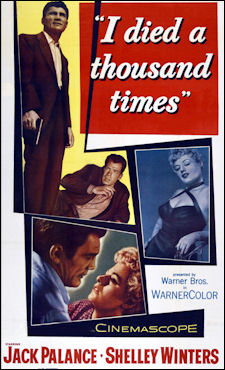
Most good films are released with decent appealing titles. But every so often a title will come along that’s exceptionally stirring, flat, dull, catchy or off-putting, and which also argues with the quality of the film, be it high or low.
Snakes on a Plane — great title, shitty film. I Dismember Mama — classic title used for exploitation sludge. Bedtime for Bonzo is actually fairly brilliant. Stop! Or My Mom Will Shoot must have sounded good before the film was seen. The Human Stain was a mildly underwhelming drama with a title that sounded like a description of semen on the bedsheets. Ishtar was a misbegotten but half-decent comedy, but had a terrible title.
I realize that today’s audience doesn’t like titles that aren’t plain and hot-dog simple, but there’s something wrong with you if you don’t enjoy titles that sound like they came off a pulp paperback. I Died A Thousand Times is one of those noirish, dark-fate titles like Out of The Past, His Kind of Woman, Let No Man Write My Epitaph and O Lord, Please Don’t Let Me be Misunderstood.
Dog Houses
After complaining about the murky image projected during last evening’s Sherlock Homes showing at the Regal Union Square Stadium 14, HE reader Gordon 27 replied that the RUSS “is the worst chain theater in NYC…everything they do nickel-and-dimes their customers, right down to the weak lamps in the projectors.” He acknowledged that “every chain does this to some extent” but claimed that the RUSS is far guiltier than most.
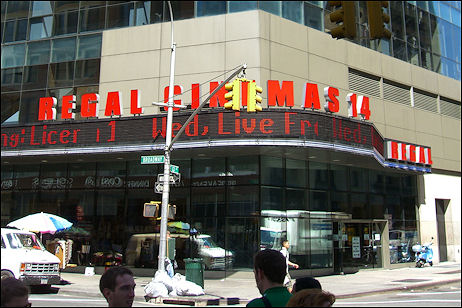
Does this plex deserve the ugly crown? Opinions, refutations, further indictments, etc.
The RUSS is probably the worst I’ve ever been to in my life — worse than the AMC Empire on 42nd Street. The projection and sound levels are substandard, to put it gently. The rows don’t allow for sufficient leg room. The seats are too small. And the people who attend are largely riff-raff. Partly retirement-age Jews, partly screaming kids, partly nice couples, partly street homies, partly middle-aged, sullen-faced X-factor types, and partly wild African dogs from the Serenghetti, shouting and roaming around and eyeballing and “hey yo”-ing each other and carrying massive buckets of popcorn and super-sized cokes sloshing over the rim and onto the carpet and plastic floors…and I’m paying money to experience this?
If my only choice was to watch films at the Regal Union Square Stadium 14 or wait three or four months for DVD, I wouldn’t even think about it. Going to a place like this is torture. As soon as you walk in you’re thinking, “I’ve gotta get outta here.”
Perhaps we could take this opportunity to list the other exceptionally awful theatres in NY, LA and other burghs. Maybe we can come up with a top ten list of some kind.
Effusion
I still haven’t seen Terry Gilliam‘s The Imaginarium of Doctor Parnassus, even though it opened on 12.25 in NY and LA. I was invited to some LA press screenings in November but none at all in NYC. I guess I’ll just pay to see it sometime this week unless, of course, someone would like to send me a screener.
Johnny Depp and Jude Law, in any event, have released the following statements regarding their involvement the film (i.e., having been hired to complete Heath Ledger‘s role in the wake of his death in early ’08).
Deep: “Maestro Gilliam has made a sublime film. Wonderfully enchanting and beautiful, The Imaginarium Of Doctor Parnassus is a uniquely ingenious and captivating creation; by turns wild, thrilling and hilarious in all its crazed, dilapidated majesty. Pure Gilliam magic!”
Who edits this stuff? It’s all well and good to say what you feel at a testimonial dinner, but when you’re on the page you need to do it with brevity and restraint, less being more, etc.
“It was an honor to represent Heath,” Depp continues. “He was the only player out there breathing heavy down the back of every established actors neck with a thundering and ungovernable talent that came up on you quick, hissing rather mischievously with that cheeky grin, ‘hey…get on out of my way boys, i’m coming through…” and does he ever! Heath is a marvel,
“And Christopher Plummer goes beyond anything he’s ever done, Waits as the Devil is a God, Lily Cole and Andrew Garfield, the very foundation, are spectacular, Verne Troyer simply kicks ass and as for my other cohorts, Colin Farrell and Jude Law, they most certainly did Master Ledger very proud, I salute them.
“Though the circumstances of my involvement are extremely heart-rending and unbelievably sad, I feel privileged to have been asked aboard to stand in on behalf of dear Heath.”
Law: “I have always loved Terry Gilliam’s films. Their heart, their soul, their mind…always inventive, touching, funny and relevant. When I got the call, it was a double tug. I liked Heath very much as a man and admired him as an actor. To help finish his final piece of work was a tribute I felt compelled to make. To help Terry finish his film was an honor paid to a man I adore. I had a great time on the job. Though we were all there in remembrance, Heath’s heart pushed us with great lightness to the finish.”
So Well Remembered
I’ve finally received a copy of Peter Biskind‘s Star: How Warren Beatty Seduced America (Simon & Schuster, 1.12.10), and have spent a total of 20 minutes of dancing through it and dwelling here and there. It’s a pleasure to read just for the quality of the writing and editing. Well-shaped sentences that are no longer than they need to be, and paragraphs that hatch and develop a thought or a mood or a theme, sometimes all three at the same time.
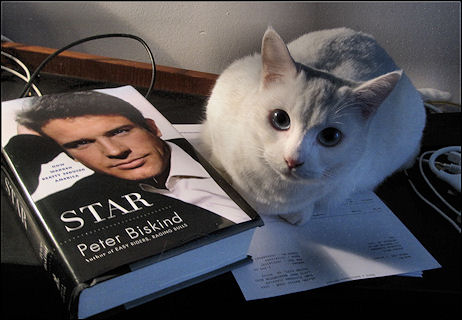
And I can tell right away that it’s been written as a kind of tragedy, or rather that Beatty’s career (as opposed to his life) has ended up that way, certainly over the last ten years, and that Biskind, being a diligent reporter and a sage fellow, has gone down that path because that’s where this beastly endeavor has taken him. Biskind has been on it since at least ’04.
“Finishing this book was like recovering from a lingering illness, although admittedly one that I had brought in myself,” Biskind writes at the start of “Warrenology: An Introduction,” about ten pages before the narrative begins.
Is “tragedy” too harsh or dismissive a term to use about Beatty’s gradual withdrawal from the hey-hey since Town and Country? Would it be fairer or kinder to say his lack of productivity (i.e., acting career over, not having directed a film) and his failure to become another Clint Eastwood has been simply due to his having gradually scared more and more would-be collaborators away because he’s so cautious and guarded and slow-moving and fickle? Would it be wrong to say that the regrettable lesson of Beatty’s late career has been (take your pick) if you cruise you lose, time is shorter than you think, shake it when you can, and keep dancing until you’re dead?
In the final chapter, on page 547, Biskind writes the following: “It is shocking to imagine a star as bright as Beatty was, as famous and powerful, and as gifted, being virtually unemployable.
“There’s no shortage of reasons that explain why filmmakers go into decline. In America, at least, the movie business has always been a young man’s game. Directing is hard, as physically and mentally demanding as any job on the planet. Filmmakers grow old and get tired like everyone else, while their audience seems to remain perennially young. Once directors become successful, they too often enter a bubble of privelege and lose whatever instincts enabled them to touch their audiences in the first place. As Billy Friedkin once put it, ‘When you take your first tennis lesson, your career is over.’
“‘It’s very hard to keep productive,’ Toback continues. ‘It’s very hard to keep the level up for the game, for the big fight, for the World Series, for the Super Bowl, and still have a life. It’s that game that people always want to talk about when they talk about talent. And when you put it out there in the world of insults and acrimony and envy and lividity, it has trouble surviving.’
“Perhaps it’s not Beatty’s last decade that makes people wonder,” Biskind writes, “but the years he spent, so unproductively, chasing skirt. Perhaps it’s the fact that Beatty turned down so many roles, in so many films and missed so many opportunities…he seemed to do so much less than someone with his gifts could have done. Perhaps it’s that he always seemed so emotionally closed, so self-protective that, as Mab Goldman put it, he was unable to ‘stand naked in the storm of life.'”
Deathly Hallows
There’s one aspect of Sherlock Holmes that deserves favor. Robert Downey, Jr. has assembled a Holmes personality apparently based on his own personal situation as he made the film — a bright and gifted fellow who’s “not there” in a kind of Dylanesque sense, and therefore has a certain something or other that holds the tiller steady. A certain fuck-all integrity? Determination? A willingness to succumb to corporate corruption?
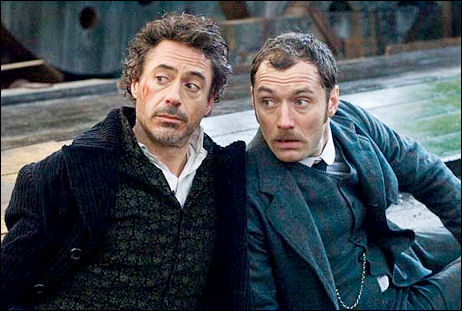
The brightness levels in this shot of Robert Downey, Jr. and Jude Law in Guy Ritchie’s Sherlock Holmes weren’t evident at tonight’s 7 pm screening at the Regal Union Square Stadium 14. The image was much darker.
I only know that Downey has figured out a way of “being” in this godawful film that holds together on some level, and that in place of exuding anything real or substantial (and what actor would attempt this under these ridiculous circumstances?) Downey ambles through with a kind of rock-solid aloofitude that…well, kind of works.
Which is to say a kind of attitude dance in which he’s a 40ish fellow who goes “eewhh, eewhh” and “doop-poop-pee-doop” and “who, me?” no matter what happens or who says what or what deathly dull villain with brownish or missing teeth is threatening him. He’s playing dry, bent, whimsical, unperturbed. He’s never been more boring, and it was the only way he could have gone, given the stakes and the salary and the bullshit levels.
And Jude Law, as Holmes’ soul mate, minder and platonic lover Watson, is playing admonishing, dryly perturbed and always patient. And away they go down the muddy London lane. Enjoy their fey verbal ping-pong or not, but if you don’t (and I didn’t, not really) then you’re dead and so is the movie. Because there’s nothing else to hold onto. Well-dressed demonic evildoers…I’m sorry, did somebody say “well-dressed demonic evildoers”? The mucky 19th Century period atmosphere is all skank and slime and dust and splinters and squalor — I’m putting myself to sleep just remembering what it was like.
Sherlock Holmes is a corporate disease movie — a period put-on concept that reaches out from the screen like a grinning Irish banshee that surrounds you with frigid air and induces a gradual comatose state. I sat there like a mental patient, but a thinking one. Within 15 minutes I was considering an early bail-out. I finally manned up and left around the 70-minute mark.
Actually, forget the banshee. I felt as if I was strapped to a gurney with a plastic tube snaking out from the screen with poison slowly feeding into my arm from an IV drip. I was sinking, dying…going under. I hated the film, yes, but mainly myself for having paid money to see it at the godawful Hell Pit known as the Regal Union Square Stadium 14. Myself and my son Dylan, scrunched into the rear row of the front section with an older couple to my left and two women to their left who were sick and tired of my coming and going (especially the final time). And I didn’t blame them.
I can’t remember any reviews that have commented on Philippe Rousselot‘s desaturated-color cinematography. It’s awfully murky and dark — seriously underlit, I mean — and quite oppressive for that. Maybe the brightness levels (i.e., foot lamberts) in the Regal projector showing the film had been deliberately turned down. Theatre chains do this, I know. All I know is that I was muttering to myself, “This godawful thing doesn’t even look good…I can’t even cruise along on the craft of it, for God’s sake.”
This isn’t Wild Wild West, but it’s a similar kind of travesty.
Community Values
What kind of animals throw loose trash on the street? People don’t do this in Santa Monica or Brentwood or Silver Lake. Or in North Bergen, for that matter. Or in Astoria or Spaha (i.e., Spanish Harlem). And East Williamsburg is thought to be a neighborhood on the upswing.

Near corner of Montrose and Bushwick — Sunday, 12.27, 4:05 pm.
Feel Nine’s Pain
Poor Nine came in eighth place this weekend, beaten by The Princess and the Frog but ahead of Did You Hear About The Morgans? It made $5,544,000, or an average of $3926 at 1412 situations. And this just doesn’t seem right. It feels like an overly harsh verdict.
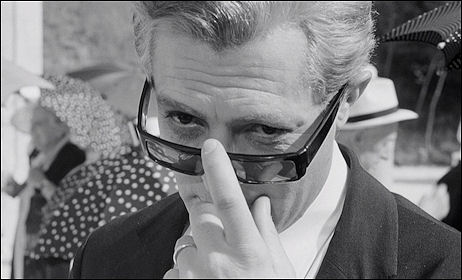
a Criterion Bluray frame-grab of Marcello Mastroianni in Federico Felllini’s 8 1/2
Nine is a reasonably decent, sometimes better-than-decent musical with its own scheme and attitude and (for me) a pair of ace performances from Daniel Day Lewis and Marion Cotillard. It’s not Cabaret, Sweet Charity or Chicago, but the terms “not half bad” and “moderately appealing” could definitely be applied. And yet it’s been clubbed right out of the gate. My heart goes out.
I know, I know — that’s the world we live in. There’s no such thing as a decently made, moderately appealing film making decent or moderate coin. For the most part movies are either instant superhits or they die like dogs — damn few seem to manage a middle road to success. It wasn’t “right” that Steven Soderbergh‘s Che died either. Scores of films obviously fail to cut it theatrically every year. Theatrical is a very costly, very tough sudden-death game.
One of my initial reactions to Nine is that it was ballsy of Harvey Weinstein to produce it in the first place, as he had to realize from the get-go that a film about Federico Fellini‘s “beautiful confusion” (i.e., the initial title of 8 1/2) wouldn’t play with the older Eloi mom-and-pop mall crowd in the same way that Chicago did. That elite mid ’60s Euro-vibe with black shades and cigarettes and coastal Italian villages isn’t a place they call home.



Will Polanski Skate?
I missed Steven Mikulan‘s 12.23 Wrap story that claimed the evil Polish dwarf is almost out of the woods regarding that 31 year-old unlawful sexual conduct beef. So much anti-Polanski hate and vitriol was expended on this site last September by the pitchforkers that it seems appropriate to address it again before the year concludes. Nothing is over until it’s over, of course, but if I were a pitchforker…
“The most important news about Roman Polanski has been nearly lost in the swirl of stories this week about the state appellate court’s rejection of his motion to dismiss the 32-year-old rape charges against him,” Miklulan wrote.
“It’s almost all over. Polanski is nearly home free.
“In rejecting the case, the court of appeal also strongly suggested that the Superior Court release the auteur on the basis of the time he’s already served behind bars.
“As TheWrap reported Monday, the court suggested that he can remedy his plight by formally requesting L.A. Superior Court Judge Peter Espinoza to hand down his sentence in absentia. That would then allow Espinoza to sentence Polanski to the time he’s already served in two jails – the 42-day stretch in Chino back in 1977, and the recent 70-day staycation in a jail near Zurich.
“Bingo: get out of jail, and out from under a three-decade-long cloud of scandal.
“What’s not been measured yet is how foolish District Attorney Steve Cooley will look before all the winking and nodding is over in this messy, sordid case.
“Had he not forced the issue by re-issuing a warrant for Polanski’s arrest, none of this would have happened. And Cooley probably made that move because, as legal commentator Jeffrey Toobin recently wrote in the New Yorker, Cooley only moved to have Polanski arrested by Swiss authorities last September “because [Polanski] seemed to have a real possibility of winning in the courts.”
“Now an appeals court has drawn the director a map out of the legal maze he’s been in.
“To be fair, Cooley has only been working with the disastrous case that was left to him by the late Judge Laurence Rittenband, a publicity-seeking jurist who, in 1977 and 1978, attempted to stage-manage the public actions of Polanski’s attorney and prosecutor as though they were actors in a dinner-theater production.”
Remember all that ugliness three months ago? “There seems to be something almost fetishistic about this case for some people,” I wrote at the time. “A weirdly lopsided and enduring sense of vengeance that the haters feel a need to pursue. There’s something oddly primal going on here. Some kind of metaphor they’re reading into it.”
I’m not trying to tweak the haters but Mikulan did report what he reported and things do seem to have gone Polanski’s way. What are they feeling about this? All that pent-up rage stretching back three-plus-decades and hater justice coming so close, and then phfffft…what happened?
I wonder what Polanski getting a get-out-of-jail card and avoiding extradition (if and when this finally happens) will do to Marina Zenovich‘s Polanski-doc sequel? She was in Switzerland and on the case just after the arrest happened three months ago. It would have been much more dramatic for the film’s purposes if RP had been flown back to the States and had faced whatever awaited.

